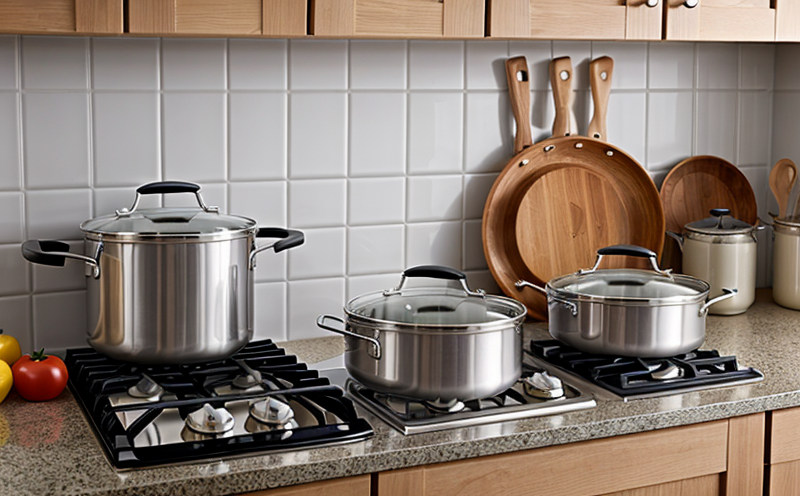Safety Testing of Cooker Handles and Locks
The safety testing of cooker handles and locks is crucial for ensuring the protection of consumers from potential hazards associated with kitchen appliances. In consumer products, particularly cookware, the handle and lock mechanism are essential components that must withstand rigorous use without compromising user safety. This service focuses on assessing these critical elements to meet regulatory requirements and ensure product quality.
Consumer products and product safety testing in this sector involve a broad range of activities aimed at identifying potential risks. The kitchenware category, specifically the cooker handles and locks, has unique challenges due to frequent handling and high stress environments. The primary goal is to prevent accidents such as burns or cuts from faulty handles or locks that do not function correctly.
Our testing process begins with a detailed review of the design specifications provided by our clients. This includes understanding the materials used in manufacturing, the intended use, and any specific requirements set forth by regulatory bodies like the American Society for Testing and Materials (ASTM) or European Norms (EN).
The actual testing involves several stages:
- Material Analysis: We analyze the materials to ensure they meet specified safety standards.
- Load Testing: Handles are subjected to various loads simulating real-world use conditions. This helps in determining their strength and durability.
- Abrasion Resistance Testing: To assess how resistant the handle is to wear and tear from frequent use, which can lead to sharp edges or cracks.
- Temperature Stability Tests: Ensuring that under extreme heat conditions, the handle does not deform, crack, or cause burns.
- Ergonomics Evaluation: Assessing the design for comfort and ease of use without compromising safety.
- Impact Resistance Testing: Evaluating how well the handle withstands impacts from accidental knocks or falls.
- Lock Mechanism Assessment: Ensuring that locks operate smoothly and securely, preventing accidents such as doors opening unexpectedly during cooking.
The results of these tests are meticulously documented and reported. Compliance with relevant standards is a key deliverable, ensuring products can be marketed safely in various regions worldwide.
By focusing on these detailed aspects, we ensure that the cooker handles and locks meet not only basic safety requirements but also exceed expectations for user comfort and product longevity. This comprehensive approach ensures that every component of your kitchenware passes stringent quality checks before reaching consumers.
Applied Standards
The testing of cooker handles and locks adheres to several international standards designed to ensure safety. Key among these are:
- ASTM F1787: This standard covers the performance requirements for the ergonomic design, construction, and durability of oven door handles.
- EN 456:2019: This European standard specifies safety requirements for kitchen appliances, including cooker handles and locks.
- IEC 60335-2-87: Pertains to the safety of household and similar electrical appliances with respect to the construction of oven door handles.
These standards provide a framework for testing that ensures products are safe, functional, and user-friendly. Compliance with these norms is essential for manufacturers looking to sell their goods internationally while maintaining high-quality standards domestically as well.
Environmental and Sustainability Contributions
The testing of cooker handles and locks also plays a significant role in promoting sustainability. By ensuring that these components are made from durable, recyclable materials, we contribute to reducing waste and extending the lifecycle of kitchenware products.
- Eco-Friendly Materials: We encourage the use of sustainable materials such as stainless steel or recycled plastics for handles and locks. These materials not only enhance durability but also reduce the carbon footprint associated with manufacturing new parts.
- Energy Efficiency: By ensuring that cooker handles do not deform under extreme temperatures, we help prevent malfunctions that could lead to excessive energy consumption during use.
- Rewritable Testing: Reusing test specimens where possible minimizes resource wastage and aligns with broader sustainability goals within the industry.
Through these efforts, we aim to contribute positively towards creating a more sustainable future by reducing waste and promoting longevity in consumer goods. This approach not only benefits manufacturers but also enhances consumer confidence in products that are both safe and environmentally responsible.
Use Cases and Application Examples
The testing of cooker handles and locks has wide-ranging applications across various scenarios. Here are some real-world examples:
- Home Cooking: Ensuring that handles do not become too hot to touch during prolonged use can prevent burns, especially for users with limited mobility.
- <<





